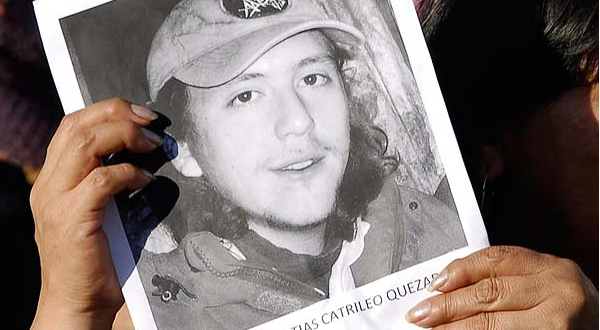It’s been 11 years since the cowardly murder of young mapuche Matías Catrileo

[resumen.cl] The recent murder of Camilo Catrillanca on 14 November brought the violence to which Mapuche communities are subjected to the forefront of the national debate like never before, and reminded us of crimes in which Carabineros [Military Police] officers caused the death of Mapuche community members. One such case is that of Matías Catrileo, murdered on 3 January 2008 by PFC Walter Ramírez Inostroza.
You can also red: Chilean military police murder another Mapuche community member
Matías Catrileo became known as an activist murdered by the Military Police, whose name was synonymous with Mapuche resistance in our time. He was murdered whilst participating in a land recovery action at Fundo Las Margaritas, owned by the quasi-feudal landholder, Jorge Luchsinger, near the community of Yeupeco Vilcún in the district of Vilcún, Araucania Region.
Born in Santiago, Matías was conscious of his Mapuche origins, and was always interested in the culture of his parents; this is why, at age 18, he began to study the Mapuche language, known as mapudungún. In 2005, he matriculated in the agronomy course at the Universidad de la Frontera (UFRO) in Temuco, where he began to deep his relationship with Mapuche territorial demands and to take an active role in the struggle together with the communities. It is because of this commitment that he was present at the land recovery action at Fundo las Margaritas, occupied by Jorge Luchsinger, on that day in early January, 2008, the day he was shot in the back, the victim of a cowardly murder.
The conversation carried on by the GOPE [Special Operations Group] patrol that fired at Matías’ group and the Communications Centre was recovered by the PDI [Policía de Investigación - National Criminal Investigation Department] and used as evidence of the disproportionate use of force by armed MPs against community members who defended themselves merely by throwing stones. In the communications, the officers are heard to say:
‘What weapons did you say they’re attacking with?’
‘With stones, with stones, and they’re burning some bundles they had in the back, but in the rear, in the rear…’ The same conversation includes the use of the words ‘put a cap in him’ by PFC Walter Ramírez Inostroza. Matías Catrileo fell victim to three of these officers who took his life from behind, perforating his lungs.
In accordance with common practice, authorities initially tried to cover up his murder by calling it a ‘shootout’, just as was initially done in the case of Catrillanca. Just as the CNI, Pinochet’s secret police, elaborately staged the scenes of their executions to make them appear to be firefights, the Military Police, in democracy, are following the same established playbook. The same goes for the reaction of the press, who saw their role as amplifying official statements rather than practising journalism, and joined in the lie that there had been a shootout, and even declared Matías a ‘terrorist’ without the slightest compunction, anything to legitimise the crime. Nonetheless, the shootout story was dismissed at trial based on a forensic report from the PDI that showed that there was no gunshot residue on Matías Catrileo’s hands.
After his lungs were deprived of air, Matías fell into a ditch. His comrades looked after his body and called the press so that the entire country would know that the peñi (brother in Mapudugún) had been murdered by the state in the form of the Military Police and prevent any attempts to manipulate the body and cover up the crime.
The investigation, which led to his conviction, showed that Military Police PFC Walter Ramírez had fired three shots at Catrileo with an UZI machine pistol. However, his sentence - to 3 years and one day of ‘probation’ - was nothing but a ratification of impunity. Ramírez remained in the Military Police until 2013, when the public pressure over having such a person on active service forced Bezmalinovic, former General of the Ninth Zone, to remove him from the ranks after first defending him by stating that he was ‘qualified to remain in the Military Police because he was sentenced to probation and the Comptroller’s Office sees no reason he should be removed from active service.’
Matías Catrileo’s murder on this day eleven years ago gave rise to a series of mobilisations and aroused solidarity with Mapuche territorial demands throughout much of Chile, where numerous protests occurred, especially at universities such as Universidad de Concepción, UFRO (where Matías Catrileo had himself been a student) in Temuco, as well as Santiago. Nonetheless, the government, under the leadership of Michelle Bachelet, sided with the Military Police, defended their actions, and refused to intervene as a complainant in the judicial inquiry, and thus became complicit in their impunity.
Read the original in spanish here: Once años del cobarde asesinato del joven mapuche Matías Catrileo
